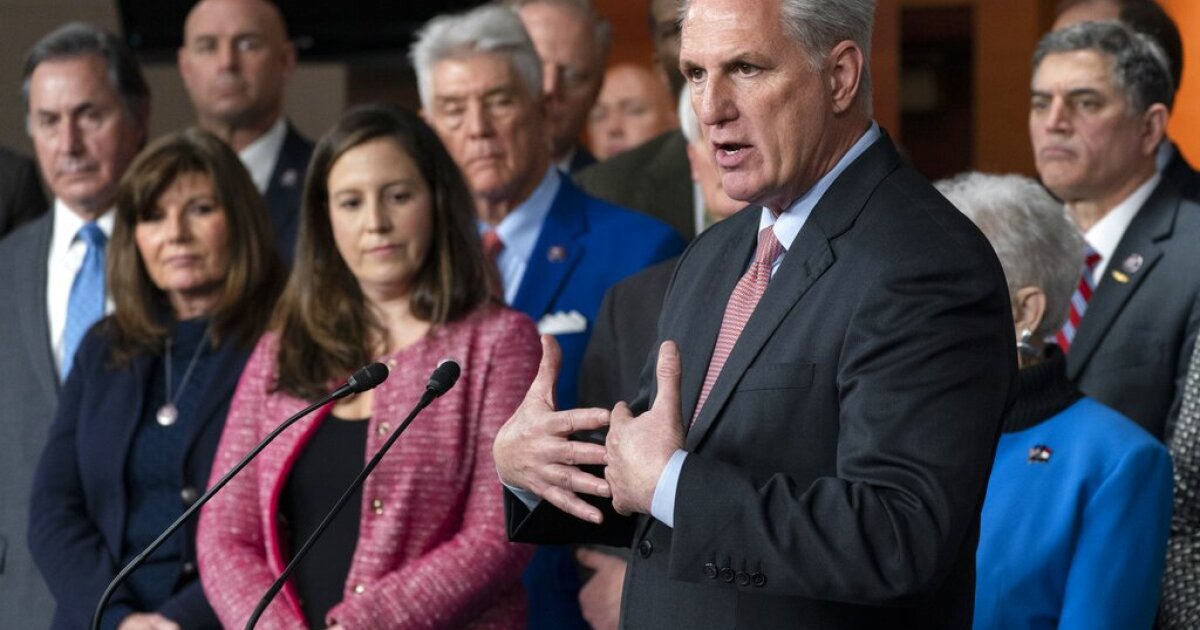

As House Republicans seek to defend their slim majority in 2024, party leaders are seeking to hammer Democrats on the very weakness that plagued the GOP last year: Candidate quality issues.
Despite initial projections that the Republican Party would take control of both chambers of Congress in the midterm elections, the GOP ultimately walked away with only a narrow majority in the House and a loss of their tie in the Senate. The party has since reflected on what led to their lackluster performance, hoping to flip the table on Democrats and expand their power in Congress next year.
STUDENTS FOR DESANTIS REACHES 100 CAMPUSES NATIONWIDE
GOP leaders have pointed to a number of reasons why their party underperformed in 2022, with many citing overall candidate quality and the lasting influence of former President Donald Trump as the culprits. Democrats were able to weaponize these characteristics throughout the midterm cycle.
Trump remained a significant player in the midterm elections, offering personal endorsements to several candidates who backed his claims of a stolen election that resulted in President Joe Biden’s victory. Meanwhile, Republican leaders largely refrained from publicly endorsing candidates in the GOP primaries, a move that allowed Trump’s hand-picked candidates to clinch the nominations.
Democrats seized on that opportunity early on in the cycle by pouring hundreds of thousands of dollars into ads to boost Trump-endorsed candidates during the primaries, viewing them as weaker candidates in the general election. That strategy appeared to work in a number of cases, particularly in the Senate, where Trump-backed candidates lost their races in four key swing states.
Senate Minority Leader Mitch McConnell (R-KY) later blamed Trump for those losses, noting his endorsements posed “candidate quality” issues that led to the GOP’s struggles.
Now, Republican leaders in both the House and Senate are shifting their strategies to avoid repeating those mistakes and instead weaponize them against Democrats.
“In 2022, they nominated dozens of candidates who were wackos. They got badly burned by the quality of their candidates, especially in Senate races. It was also a big problem in the House,” Brad Bannon, a Democratic strategist, told the Washington Examiner. “If they can turn the tables, that would definitely help them.”
Senate Republicans have gotten an early start by endorsing favored candidates in key GOP primaries, a reversal from last year when party leaders chose not to intervene. National Republican Senatorial Committee Chairman Steve Daines (R-MT) has already backed a number of candidates in high-profile Senate races, hoping to avoid nominating a fringe candidate who is likely to lose in the general election.
So far, the NRSC has thrown its support behind Sam Brown in Nevada, Rep. Jim Banks in Indiana, Tim Sheehy in Montana, and Gov. Jim Justice in West Virginia — demonstrating a concerted effort to boost the party’s preferred candidates.
Meanwhile, House GOP leaders are taking on a different tactic. National Republican Congressional Committee Chairman Richard Hudson has maintained the party won’t make endorsements in contested primaries. However, he vowed to help boost candidates early on in the cycle to strengthen campaigns against Democratic challengers.
“I think you may see us get involved earlier in terms of helping people build better campaigns,” Hudson told Fox News earlier this year. “If we’ve got an open seat and there are a number of candidates that we think have a good chance of winning in the general election and reach out to us and want to work with us, then we’re going to work with them and make sure they build strong campaigns even in the primaries.”
House Republicans are hammering Democrats over their own “candidate quality” issues, focusing specifically on far-left candidates in key races in an effort to defend their majority.
The Congressional Leadership Fund, a super PAC closely tied to Speaker Kevin McCarthy (R-CA), is targeting a handful of Democratic candidates who previously lost to Republicans in the midterm elections, especially in districts that are expected to be some of the most competitive races in 2024.
For example, the CLF is zeroing in on Sue Altman, who is running against Rep. Thomas Kean Jr. (R-NJ) in New Jersey, a race that has been deemed a tossup by the nonpartisan Cook Political Report. Altman launched her bid shortly after former Rep. Tom Malinowski, who lost to Kean Jr. in 2022, said he would not seek a rematch. (Malinowski was widely considered to be the front-runner if he chose to run.)
Republicans were quick to jump on Altman’s announcement and decry the Democrat for her connection to the New Jersey Working Families Alliance, which has repeatedly expressed support for anti-police activist groups. That opens an opportunity for Republicans to attack Altman, as crime emerged as one of the top voter concerns for New Jersey voters last year.
Similar attacks could be used against former Rep. Mondaire Jones, who is running against freshman Rep. Mike Lawler (R-NY) in New York. Jones has previously called for the partial defunding of police forces as well as the abolition of cash bail — something that could deter support from centrist voters living in high-crime areas.
“It’s incumbent on the Democrats to nominate candidates who don’t have the same sort of blemishes that the Republicans do and did in 2022,” Bannon said. “And it’s incumbent upon the Republicans to intervene in Democratic primaries to get Democrats to nominate the worst possible candidate.”
But Republicans must be able to strike a delicate balance when doing so, some strategists say. While several Democrats are running unopposed in their primaries, some, such as Altman and Jones, must first face a crowded field of challengers — meaning early attacks from the GOP could help boost moderate candidates in a blow to their own strategy.
CLICK HERE TO READ MORE FROM THE WASHINGTON EXAMINER
“Attack when the attack is appropriate and hold your fire until the Democrats have made their nominations — you certainly don’t want to make it easy for Democrats to nominate, you know, sane candidates. So I do think there’s a strategy to this,” said GOP strategist John Feehery.
“If the candidate is clearly going to win the primary, it makes sense to define them early,” he added. “But if a candidate is in an open primary and it’s not clear who’s going to win, sometimes it’s better to let the natural course of a primary campaign take over or work to get the most extreme candidate nominated.”




